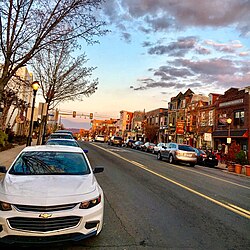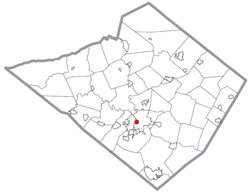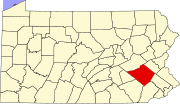West Reading, Pennsylvania
Borough of West Reading | |
|---|---|
 Penn Avenue | |
 Location of West Reading in Berks County, Pennsylvania. | |
| Coordinates: 40°20′03″N 75°56′48″W / 40.33417°N 75.94667°W | |
| Country | United States |
| State | Pennsylvania |
| County | Berks |
| Incorporated | March 18, 1907 |
| Government | |
| • Type | Council – Mayor Government |
| • Council President Mayor | Andrew Kearney |
| Area | |
• Total | 0.60 sq mi (1.55 km2) |
| • Land | 0.59 sq mi (1.54 km2) |
| • Water | 0.00 sq mi (0.01 km2) |
| Elevation | 285 ft (87 m) |
| Population (2010) | |
• Total | 4,212 |
• Estimate (2018)[2] | 4,223 |
| • Density | 7,087.54/sq mi (2,734.89/km2) |
| Time zone | UTC-5 (EST) |
| • Summer (DST) | UTC-4 (EDT) |
| ZIP code | 19611 |
| Area code(s) | 610 and 484 |
| FIPS code | 42-83928 |
| Website | www |


West Reading is a borough in Berks County, Pennsylvania, United States. The population was 4,212 at the 2010 census. It contains a vibrant main street (Penn Avenue) and the large Reading Hospital and Medical Center. It is also the site of the VF Outlet Village, one of the largest outlet malls in the United States. The VF Outlet Village is located in the buildings of the former Berkshire Knitting Mills, which was in operation from 1908–1975.[3]
Geography
According to the United States Census Bureau, the borough has a total area of 0.6 square miles (1.6 km2), all of it land.
Demographics
| Census | Pop. | Note | %± |
|---|---|---|---|
| 1880 | 170 | — | |
| 1910 | 2,064 | — | |
| 1920 | 2,921 | 41.5% | |
| 1930 | 4,908 | 68.0% | |
| 1940 | 4,907 | 0.0% | |
| 1950 | 5,072 | 3.4% | |
| 1960 | 4,938 | −2.6% | |
| 1970 | 4,578 | −7.3% | |
| 1980 | 4,507 | −1.6% | |
| 1990 | 4,142 | −8.1% | |
| 2000 | 4,049 | −2.2% | |
| 2010 | 4,212 | 4.0% | |
| 2018 (est.) | 4,223 | [2] | 0.3% |
| Source: US Census Bureau | |||
As of the census[4] of 2000, there were 4,049 people, 1,666 households, and 862 families residing in the borough. The population density was 7,079.6 people per square mile (2,742.7/km²). There were 1,783 housing units at an average density of 3,117.5 per square mile (1,207.8/km²). The racial makeup of the borough was 89.33% White, 4.03% African American, 0.22% Native American, 1.53% Asian, 0.02% Pacific Islander, 3.41% from other races, and 1.46% from two or more races. Hispanic or Latino of any race were 7.78% of the population.
There were 1,666 households, out of which 23.6% had children under the age of 18 living with them, 36.0% were married couples living together, 11.9% had a female householder with no husband present, and 48.2% were non-families. 39.4% of all households were made up of individuals, and 14.3% had someone living alone who was 65 years of age or older. The average household size was 2.11 and the average family size was 2.84.
In the borough the population was spread out, with 18.7% under the age of 18, 8.2% from 18 to 24, 28.8% from 25 to 44, 18.0% from 45 to 64, and 26.3% who were 65 years of age or older. The median age was 40 years. For every 100 females there were 82.6 males. For every 100 females age 18 and over, there were 78.8 males.
The median income for a household in the borough was $38,340, and the median income for a family was $43,472. Males had a median income of $31,592 versus $25,411 for females. The per capita income for the borough was $21,414. About 5.8% of families and 9.5% of the population were below the poverty line, including 16.0% of those under age 18 and 3.6% of those age 65 or over.
Economy
The Reading Hospital and Medical Center is the largest employer in the borough and one of the top five employers in Berks County. The parent company, Tower Health has its headquarters in the borough.
West Reading also has a bustling business district with bars, restaurants, shops, and salons.
Government
The Borough of West Reading is governed by a council-manager form of government. The President of the Council is Philip Wert and the Vice President is Christopher Lincoln. The five other members are as followed: Patrick Kaag, Jennifer Bressler, Nicholas Gardecki, Jack Gombach, and Suzanne Thompson. Each member of council is elected to a four-year term in a rotating cycle. The Mayor of the Borough is Andrew Kearney and his main role is public safety. The council is made up of six Democrats and one Republican. The Magisterial District Judge of West Reading (and Wyomissing) is Eric J. Taylor.
History
The borough was settled in 1873 and incorporated on March 18, 1907. It celebrated its 100th anniversary in 2007.
1733 – Three Welshmen- Hugh Jones, David Lewis, and Evan Price were the first settlers to be granted warrants for the land west of the Schuylkill River.
1810 – A brick home, one the first buildings in what would become West Reading, is erected and occupied by William Hinnershitz.
1857 – The Lebanon Valley Railroad Bridge is completed.
1873 – Frederick Frill laid out his plan of lots on land which consisted of about 90 acres. The Frill plan covered land that was north of Chestnut Street and east of Tulpehocken Avenue.
1874 – George Eckert purchased a block of lots along Penn Avenue, extending from Second to Third Avenue.
1876 – The largest industry was the Alexander Hat Factory at First Avenue and Franklin Street.
1877 – The Lebanon Valley Railroad bridge was destroyed during the railroad riot.
1884 – The Penn Street Bridge is replaced with one made with steel trusses.
1898 – Spring Township builds a new eight-room brick school building on the northeast corner of Fifth Avenue and Chestnut Street.
1901 – West Reading Fire Company No. 1 is incorporated.
1907 – On March 18, West Reading is incorporated as a Borough. The first public election is held at John Kintzer's public house; the first Borough officials are elected. In addition, West Reading's Board of Education is organized; the first school sessions for the West Reading School District are held at a school building on the corner of 5th and Chestnut Streets.
1908 – Sessions for grades 7and 8 are held in a private house on the southeast corner of 5th and Franklin Streets.
1910 – A two-story brick engine house is erected in the 400 block of Franklin Street.
1913 – The steel truss Penn Avenue bridge is replaced with a concrete arch bridge.
1914 – West Reading High School is built on the corner off 4th and Franklin Streets.
1919 – The largest industry in West Reading is Narrow Fabric Co., manufacturer of undergarments.
1923 – The Borough police force is established with one police officer. A new auditorium/gymnasium is added to the high school.
1925 – The West Side News, a monthly newspaper published and distributed in the Borough, begins a nearly 40-year run.
1926 – The Borough acquires property at South Fifth Avenue and Chestnut Street for the new borough hall, which is completed the following year. Final construction of the east and west classroom wings and library are added to the high school.
1929 – Borough Council decides to construct a new playground on 16 acres at Westside Road (now called Museum Road) and Sycamore Road.
1932 – The Buttonwood Street Bridge is built between West Reading and Reading.
1939 – Wyomissing Industries presents the citizens of West Reading with a $25,000 stone field house for the borough playground, which is now a well-rounded recreational facility with a swimming pool, wading pool, athletic field, quarter-mile track, ice skating rink, and basketball, volleyball and tennis courts.
1950 – West Reading is the largest of the county's 30 borough's.
1953 – The new West Reading Elementary building is constructed on the northwest corner of 4th and Chestnut Streets.
1954 – The school building located at Fifth Avenue and Chestnut Street is razed to provide space for a school play area.
1968 – West Reading Borough Council joins two other boroughs- Shillington and Wyomissing- in the formation of a regional water supply system, later to be known as the Western Berks Water Authority, to "collect, treat, and transmit water from the contemplated Blue Marsh Dam area and sell it to prospective customers."
1969 – The West Reading and Wyomissing School Districts merge.
1985 – The Wyomissing Area School District sells the West Reading High School Building. The building becomes the "Public School Commons" apartments.
1999 – The "Main Street" project begins the revitalization of Penn Avenue.
2002 – A new fire station is erected at Parkview Road and Playground Drive.
2005 – West Reading Borough Council joins with the Borough of Wyomissing, Spring Township, and Sinking Spring Borough to create the West Side Emergency Management Agency.
2006 – Penn View Motel demolition begins. In addition, the former Neg-Tech building at Chestnut and Yarnell Streets is demolished- making way for three new townhouses. Construction begins with 58 new townhouses on the former Narrow Fabric property west of Tulpehocken Avenue.
2017 – The Berkshire Knitting Mills, once the world's largest hosiery manufacturer, which occupied the site from early 1900's until its purchase in 1969 by Vanity Fair Corporation underwent renovations to transform the four-story building into an office and retail campus known as the Knitting Mills.
2018 – The former Narrow Fabric manufacturing building underwent renovations with a restaurant and gym located on the first floor and the top three floors featuring one and two-bedroom apartments.
References
- ^ "2017 U.S. Gazetteer Files". United States Census Bureau. Retrieved Mar 24, 2019.
- ^ a b "Population and Housing Unit Estimates". Retrieved October 18, 2019.
- ^ "About Us". vfovillage.com.
- ^ "American FactFinder". United States Census Bureau. Retrieved 2008-01-31.



